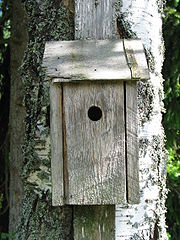- Caja nido
-
Caja nido
Una caja nido o una casa de pájaros es un nido artificial hecho para que aves o murciélagos aniden en el.
Hay muchas aves que anidan en huecos de árboles viejos y grietas, pero debido a la tala de árboles y los cultivos de árboles para madera o papel no hay muchos árboles viejos. Para facilitar que estos pájaros encuentren un lugar adecuado se construyen nidos artificiales.
El tamaño del agujero sirve para selección el tamaños de las especies. Si el agujero es más grande es fácil que otros pájaros mayores echen a la especies más pequeñas.
Un agujero ajustado también dificulta el ataque de predadores. Además el agujero no esta al ras de la pared o del árbol, lo que impide que un serpiente acceda al agujero ya que se tendría que separar mucho de la superficie vertical y no podría agarrarse.
También existen nidos para murciélagos. También anidan en grietas de árboles además de en cuevas.
Las forma es diferente. Son abiertos por abajo y no tienen agujero. Las aves no pueden anidar ahí. Estos se suelen colocar mas en paredes que en árboles.
Estos nidos no solo son útiles para proteger la naturaleza, también pueden ser útiles para el control biológico si atraen especies insectívoras. Sobre todo porque los polluelos tienen un crecimiento muy rápido y son muy voraces.
Bibliografía
- García-Navas, Vicente; Arroyo, Luis; Sanz, Juan José; Díaz, Mario (2008). "Effect of nestbox type on occupancy and breeding biology of tree sparrows Passer montanus in central Spain" (PDF). Ibis 150: 356–364. http://www.ccma.csic.es/index.php/es/def/pdf1330?modelo=publicación.
- "Bats and Bat Houses". Mosquito Abatement District-Davis Headquarters, Kaysville, UT. http://davismosquito.org/mosquitoes/batsandhouses.htm. Retrieved 2007-11-17.
- McAvoy, Gene. "Hendry County Horticulture News: Bats Eat Mosquitoes as Well as Numerous Garden Pests". University of Florida; Cooperative Extension Service. http://hendry.ifas.ufl.edu/HCHortNews_Bats.htm. Retrieved 2007-11-17.
- "Single chamber bat house (wall mounted)". Bat Conservation International. http://www.batcon.org/bhra/economyhouse.html. Retrieved 2007-11-17.
- Brown, Carla. "Why I Built A Bat House". National Wildlife Federation. http://www.nwf.org/backyard/bathouse.cfm. Retrieved 2007-11-17.
- Boleky, Vaughan (2005-2006). "Why Are Bat Houses Important?". Organization for Bat Conservation.
- Hans-Werner Bastian: Vogelgerechte Nistkästen selbst gebaut. Franckh-Kosmos Verlag, 2000, ISBN 3-44008103-6
- Hans Freiherr von Berlepsch: Der gesamte Vogelschutz. Seine Begründung und Ausführung auf wissenschaftlicher, natürlicher Grundlage. 12. Auflage. Neudamm: Neumann 1929
- Gerhard Föhr: Nistkästen und Vogelschutz im Wandel der Zeit. Die neue Brehm-Bücherei (Band 651). Westarp-Wissenschaften, Hohenwarsleben 2005, 91 S., ISBN 3-89432-909-2
- Eberhard Gabler: Nistkästen und Futterhäuschen. Bauanleitungen und Praxistipps. BlV Verlagsgesellschaft, München 2003, ISBN 3-40516489-3
- Otto Henze, Günther Zimmermann: Gefiederte Freunde in Garten und Wald. Beobachten – Erkennen – Schützen. München: Bayerischer Landwirtschaftsverlag (BLV) 1964
- Otto Henze (Begründer), Johannes Gepp: Vogelnistkästen und Naturhöhlen in Garten, Wald & Revier. Bestimmungsbuch Nester & Gelege. 6. Aufl. Leopold Stocker Verlag, Graz und Stuttgart 2004 , ISBN 3-7020-0992-2
Enlaces externos
 Wikimedia Commons alberga contenido multimedia sobre Caja nido.Commons
Wikimedia Commons alberga contenido multimedia sobre Caja nido.Commons- Como atraer aves. Cajas nidos y otros métodos
- Nest box page from the Royal Society for the Protection of Birds.
- Nest box plans: bluebirds, purple martins and others.
- How to build a nest box.
- Birds Australia Information Sheet 5: Nestboxes for Natives PDF download
- Anleitung zum Selbstbau von Nistkästen und Nisthilfen für Vögel (bei NABU)
- BUND-Nistkasteninfo
- Informationen und Bauanleitungen vom Landesbund für Vogelschutz
- Nistkästen bauen und Vogelschutz für Kinder
- http://oberpfaelzer-nistkaesten.de
- http://nistkastenmuseum.de
Categoría: Aves
Wikimedia foundation. 2010.

